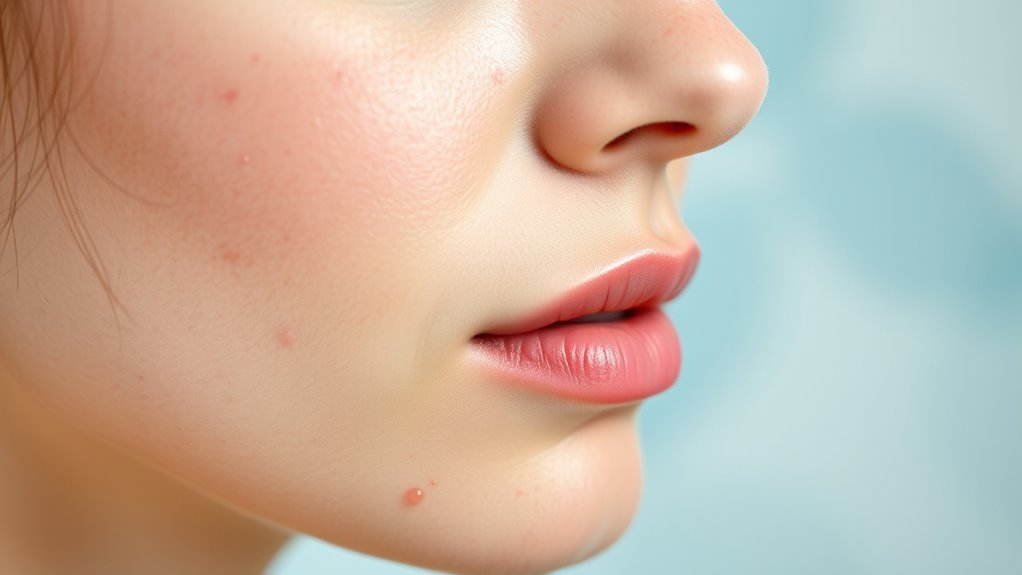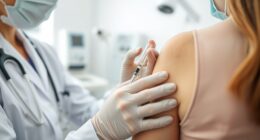Hormonal acne is mainly caused by fluctuations in hormones like androgens, which increase oil production and clog pores. This type of acne often appears along the jawline, chin, and neck, and tends to be persistent. Lifestyle and diet can also influence hormone levels, worsening breakouts. To manage it, focus on gentle skincare, use targeted treatments, and consider medical options like hormonal therapy. Keep exploring to discover more effective ways to tackle hormonal breakouts.
Key Takeaways
- Hormonal fluctuations, especially increased androgens, stimulate oil production, leading to clogged pores and acne.
- Hormonal acne typically appears as cystic bumps along the jawline, chin, and neck, linked to menstrual cycles.
- Diets high in sugar, dairy, processed foods, and stress can worsen hormonal imbalances and acne severity.
- Gentle cleansers, salicylic acid, benzoyl peroxide, and topical retinoids are effective treatments for managing hormonal acne.
- Consulting healthcare providers for hormonal therapies like birth control or anti-androgens can help control persistent hormonal acne.
Understanding Hormonal Fluctuations and Their Impact on the Skin
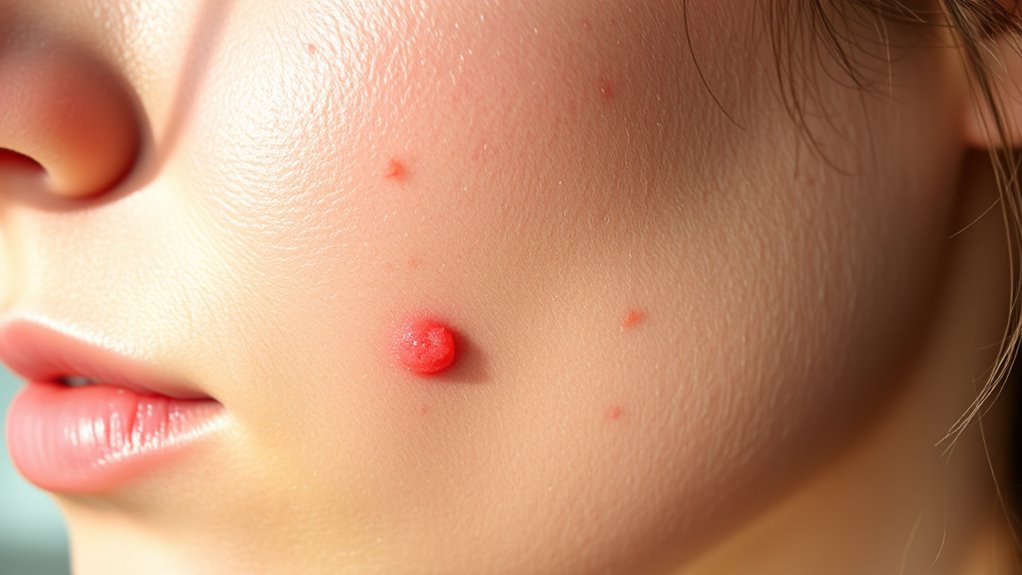
Hormonal fluctuations can markedly influence your skin, especially during times like puberty, menstrual cycles, or stress. When hormones like androgens increase, they stimulate oil glands, leading to excess oil production. This excess oil can clog pores and create an environment prone to breakouts. During puberty, hormonal shifts are sudden and intense, often causing visible changes. Menstrual cycles bring predictable fluctuations, making your skin more prone to acne just before your period. Stress triggers the release of cortisol, which can further disrupt your hormonal balance and worsen skin issues. Recognizing these natural fluctuations helps you understand why your skin behaves differently at various times. Being aware of these patterns allows you to better manage breakouts and adopt skincare routines suited to your hormonal changes. Additionally, hormonal imbalances can be influenced by factors such as lifestyle and diet, further affecting your skin’s condition.
How Hormones Influence Oil Production and Pore Clogging

Have you ever noticed how your skin becomes oilier and more prone to breakouts before your period or during stressful times? That’s because hormones like androgens increase oil production in your skin’s sebaceous glands. This excess oil can mix with dead skin cells, clogging pores and creating the perfect environment for acne-causing bacteria. When hormones fluctuate, your skin responds by producing more oil, leading to blackheads and pimples. Understanding hormonal fluctuations can help you better manage your skin health and choose effective treatments.
Differentiating Hormonal Acne From Other Types of Acne

While fluctuations in hormone levels often trigger breakouts, not all acne is caused by hormones. Hormonal acne typically appears as deep, cystic bumps mainly along the jawline, chin, and neck. These breakouts tend to be persistent and occur around your menstrual cycle or during hormonal shifts like pregnancy or menopause. In contrast, non-hormonal acne often shows up as smaller, surface-level pimples or blackheads on the forehead, cheeks, or nose. It may be linked to factors like clogged pores, bacteria, or skin irritation rather than hormonal fluctuations. Recognizing these differences can help you identify whether hormones play a significant role in your breakouts, guiding you toward more targeted treatments and avoiding unnecessary skincare products.
Lifestyle and Dietary Factors That Contribute to Hormonal Acne
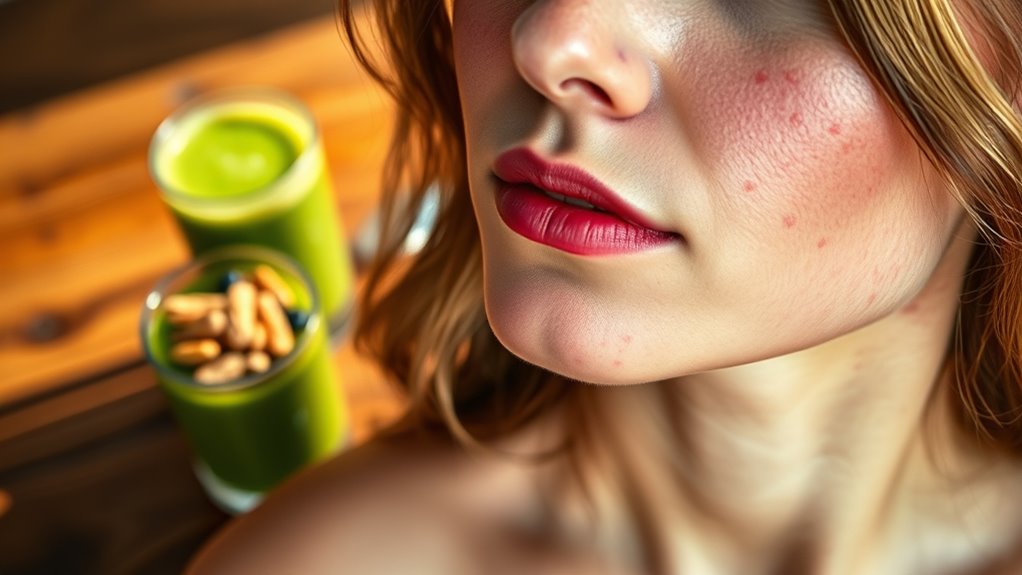
Your lifestyle and dietary choices can considerably influence hormonal acne. Eating high-sugar foods, processed snacks, and dairy can trigger hormone fluctuations, leading to breakouts. Stress and lack of sleep also increase cortisol levels, which worsen acne. Additionally, excessive alcohol consumption dehydrates your skin and disrupts hormone balance. To help you understand better, here’s a quick overview:
| Food Type | Impact on Hormones | Common Sources |
|---|---|---|
| Sugary foods | Spike insulin, boost oil production | Candy, soda, baked goods |
| Dairy | Contains hormones that may increase oil | Milk, cheese, yogurt |
| Processed foods | Increase inflammation, hormone disruption | Fast food, chips, frozen meals |
| Alcohol | Elevates cortisol, dehydrates skin | Beer, wine, spirits |
Making mindful choices can help reduce hormonal fluctuations and improve your skin. Understanding hormone regulation is key to managing hormonal acne effectively.
Effective Treatments and Skincare Strategies for Hormonal Acne
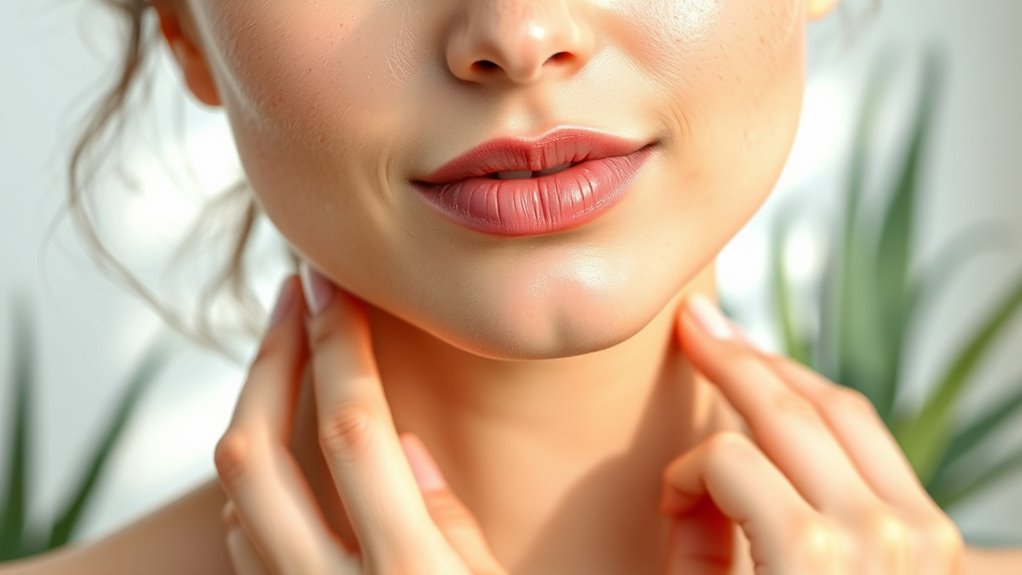
Effective treatments and skincare strategies for hormonal acne focus on balancing hormones, reducing inflammation, and preventing breakouts. Start with gentle cleansers designed for acne-prone skin to keep pores clear without stripping natural oils. Incorporate products containing ingredients like salicylic acid or benzoyl peroxide to target existing blemishes. Consider topical treatments with retinoids to promote cell turnover and prevent clogged pores. For hormonal imbalance, consult a healthcare professional about options like birth control or anti-androgens. Maintain a consistent skincare routine and avoid irritating products that can worsen inflammation. Additionally, prioritize a balanced diet, get enough sleep, and manage stress levels. Understanding the refrigeration cycle can help in maintaining the optimal functioning of skincare devices that utilize thermoelectric cooling technologies. These combined approaches help reduce breakouts and improve your skin’s overall health.
Frequently Asked Questions
Can Hormonal Acne Appear at Any Age?
Yes, hormonal acne can appear at any age, not just during your teenage years. Factors like stress, medication, or hormonal imbalances from conditions such as polycystic ovary syndrome can trigger breakouts in adults and older adults. You might notice flare-ups even in your 30s, 40s, or beyond. If you experience persistent or sudden breakouts, it’s a good idea to consult a dermatologist to identify underlying causes and find effective treatments.
Are There Specific Hormones Linked to Hormonal Acne?
Hormonal acne is influenced by certain hormones that regulate oil production and skin cell turnover. You’ll find that androgens, like testosterone, play a significant role by increasing oil glands’ activity. Fluctuations in hormones during puberty, menstruation, pregnancy, or menopause can trigger breakouts. Knowing these hormonal links helps you understand why your skin reacts at different life stages and can guide you toward effective treatments to manage your acne.
How Long Does Hormonal Acne Typically Last?
Hormonal acne can feel like an unwelcome guest who overstays their welcome, but its duration varies. Typically, it lasts from a few months up to a couple of years, especially if hormonal fluctuations persist. Your skin’s response depends on factors like age, hormonal balance, and skincare routines. Staying consistent with treatments and consulting a dermatologist can help you clear this chapter more quickly, turning the page to healthier skin.
Do Hormonal Contraceptives Help Treat Hormonal Acne?
Yes, hormonal contraceptives can help treat hormonal acne. They work by regulating your hormone levels, especially androgens, which often trigger breakouts. When you start taking the pill, it can take a few months to see improvements. Keep in mind, not all contraceptives are equally effective, so it’s important to consult your healthcare provider to find the right option for your skin and overall health.
Are Natural Remedies Effective for Hormonal Acne?
Imagine fighting a wildfire with just a garden hose—that’s how natural remedies often feel for hormonal acne. While some herbs and lifestyle changes can help soothe your skin, they might not fully extinguish the blaze caused by hormonal imbalances. You might see some improvement, but for stubborn or severe cases, combining natural options with medical treatments is usually more effective for controlling hormonal acne.
Conclusion
Think of hormonal acne as a storm brewing inside you. By understanding the clouds of hormonal fluctuations and steering your lifestyle and skincare like a steady lighthouse, you can calm the tempest. With patience and the right treatments, you’ll find clarity beyond the chaos, revealing clearer skin like a dawn breaking through the storm. Remember, you hold the power to restore balance—your journey toward confidence is a sunrise waiting to happen.
